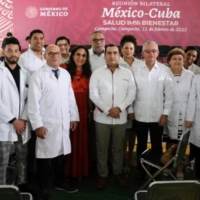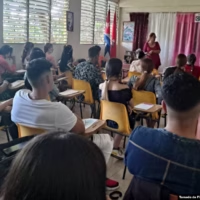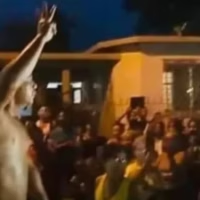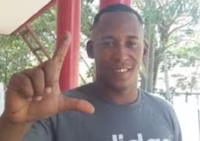On a campaign stop in Florida earlier this month, Joe Biden declared his concern for “the Hispanic community, which is hurt very badly, much worse than the Caucasian community” by Covid-19.
It’s hard to decide if the former vice president was engaging in a feeble attempt to play the race card or was displaying sheer ignorance. Perhaps it was some of both. In any case, it helps explain why his campaign is struggling among Cuban-Americans in Florida.
Almost six decades after President Kennedy withdrew, midmission, from a promise to provide air cover to an anti-Castro operation at the Bay of Pigs, Democrats are still out of touch with this powerful political cohort
Hispanics are not a race—nor an ethnicity. The term refers to people whose mother tongue is Spanish or whose roots trace to a Spanish-speaking population. Hispanics come in all races and from many ethnicities. While Spain colonized much of the Western Hemisphere, cultural differences among countries can be significant. Chileans and Dominicans, for example, share a common language, but their customs differ in
many Polls have Mr. Biden and President Trump in a dead heat in Florida. That’s not unexpected. Mr. Trump won Florida in 2016 by only a little more than one percentage point. What’s new, according to an
NBC News/Marist poll earlier this month, is Mr. Trump’s lead—50% to 46%—over Mr. Biden among Hispanics in the state.
The Trump campaign is reportedly making inroads with the large Puerto Rican vote in central Florida, though a majority are still expected to go for Mr. Biden. But it is the president’s strong support among Cuban-Americans that best explains his lead among “Hispanics.” in many ways.
Cuban-Americans are white, black and of mixed race. Some of them, getting up in years by now, arrived in the U.S. as refugees soon after Fidel Castro hijacked a popular revolution aimed at restoring the 1940 constitution. Many others came later, in daring escapes throughout more than a half-century of military rule that has driven the island into extreme poverty. Their children and grandchildren, born Americans, know well the heartache of their forefathers and their families torn apart by tyranny.
Many Cubans who fled Castro barbarism have built successful lives north of the Straits of Florida, whether they arrived in the 1960s or later. But you’d be hard-pressed to find any that don’t mourn the loss of their homeland and yearn to see it free again. This includes Cuban-Americans of color whose brethren still on the island suffer disproportionately under the racist regime.
When President Obamawent to Cuba in 2016 and attended a baseball game with Raúl Castro and members of the Colombian terrorist group FARC, his supporters saw him as the king of cool. But Cuban-Americans gagged alongside many refugees from Venezuela, which is now a Cuban satellite.
Mr. Obama normalized relations with the dictatorship, but demanded no human-rights concessions in return. Then-deputy national security adviser Ben Rhodes, who crafted the policy, may have been clueless about the huge wealth gap—between the ruling elite and the Cuban people—and the totalitarian system that sustains it. But Cuban-Americans are not. If Mr. Biden is having trouble attracting victims of this oppression who now vote in the U.S., or their offspring, it’s hardly surprising.
Human rights may be the issue that most unifies Cuban-Americans. But 58 years after the Cuban missile crisis, Cuba also remains a serious national-security threat, argues Cuban exile Néstor T. Carbonell in his latest book, “Why Cuba Matters.” The regime is desperate for foreign subsidies and still seeks to earn them by forming partnerships with America’s military and political rivals such as Russia and China. Access to an island in close proximity to American shores offers them a base for military and intelligence operations and for spreading disorder throughout the region.
Mr. Carbonell shows how American “intelligence” has habitually underestimated the narcissism, greed and ruthlessness of the Castro brothers. This partly accounts for the U.S. failure, over decades, to dislodge foreign interlopers and restore liberty on the island, he says.
But there has also been a political problem: Much of the American left has long refused to acknowledge the horrors of the dictatorship. Even after the Castro regime became known for terrorizing its own people and sowing revolution throughout the hemisphere, socialist ideologues continued to romanticize the tyranny. President Obama’s Cuba policy reflected that bias.
Cuban-Americans are not a monolithic group and obviously their priorities for good governance run the gamut. But they share a common history marked by tragedy that is not easily forgotten.
While President Trump’s hard-line approach to the regime hasn’t freed the island, it seems to be more compatible with the sensibilities of Cuban-Americans than Mr. Obama’s failed appeasement. Apparently this may matter when they go to the polls.
:
Muchas gracias Cassie por compartir este artículo. El problema es que para leerlo requiere una subscripción al Wall Street Journal. Traté de leerlo entrando por Google pero me ocurrió lo mismo.
La comunidad nuestra en Miami, especialmente los de nuestra generación, conocen muy bien lo que significa el comunismo que se disfraza como socialismo para penetrar en los paises.
Saludos a Mike y a seguir cuidándose del Virus
Olga y Luis
Queridos amigos,
I thought this article in today’s WSJ would interest you.
Caundo van a darse que cuenta la izquierda de este país?
Recuerdos,
Casilda y Mike




More Stories
La verdad sobre las misiones médicas de Cuba
Alertan sobre verdadera motivación del Colegio Universitario en Holguín
Hermanos condenados por protesta en Caimanera enfrentan trabajo forzado y falta de medicamentos